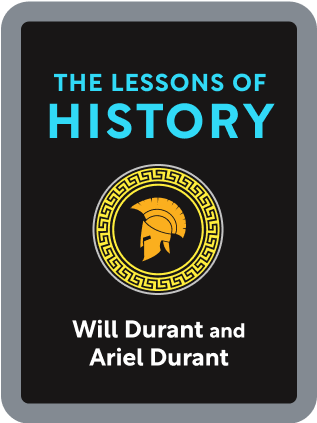

This article is an excerpt from the Shortform book guide to "The Lessons of History" by Will Durant and Ariel Durant. Shortform has the world's best summaries and analyses of books you should be reading.
Like this article? Sign up for a free trial here .
What is the history of race in society? What role has race played in civilizations?
In The Lessons of History, Will and Ariel Durant discuss race in society and how character shapes social change over time. They argue that history is color-blind—that civilization is not determined by race. They also discuss human nature and how inequality comes into play in society.
Read more to learn a historical perspective on human nature and race in society.
Race in Society: The Bias Perspective
It can be argued that western history has been biased toward the success of the white man. Here are a few examples.
- 1800s French elitist Gobineau believed that a civilization’s success depended on the quality of the race.
- He stressed that environmental advantages cannot explain the rise of civilization, since similar soil-fertilizing rivers that watered Egypt produced no civilization in North America.
- He saw degeneration of civilization when intermarriage with the conquered race.
- He also believed in a superior Aryan race.
- American Madison Grant confined achievements to a branch of Aryans he called “Nordics” – Scandinavians, Baltic Germans, Anglo-Saxon Americans
- He believed these northern tribes swooped down South and conquered, invading India and setting the caste system to prevent intermarriage; creating the Athenians and Romans of the Republic; and conquering England, France, Italy.
- He bemoaned the thinning of Nordic stock through wars and higher birth rate of Alpine and Mediterranean peoples, though he credited the Mediterranean race with superior intellectual and artistic attainments.
Race in Society: The Color-Blind Perspective
The Durants reject all of this in The Lessons of History. They believe that “history is color-blind” and can develop civilization under any skin, given a favorable environment. Ancient Chinese, Egyptian, Rome civilizations counter the notion of Aryan superiority.
“Would any of the white races” have done better in Africa? The authors note that the heights of achievement of African-Americans are remarkable, despite their deep structural setbacks.
Civilization is not determined by race in society. Instead, civilization development is a factor of geographic opportunity and economic and political development.
In turn, civilization makes the people. People who live in new areas adopt the new culture. Ethnic mixtures over centuries create a new type of people and culture.
A race-centric view of history is narrow-minded. A broadened education is the cure for a racially biased view of history. Civilization is a “cooperative product” – all people have contributed to it in some way.
Human Nature and History
Man’s character sets the character of groups and nations.
Human nature includes both positive and negative, balancing action vs inaction; fight vs flight; acquisition vs avoidance; association vs privacy; mating vs refusal; parental care vs filial dependence.
Has human nature changed? The historian authors say no – history shows that humans have conducted themselves the same way, time and time again, throughout thousands of years. The means of exercising human nature have changed; the motives remain the same.
Social and Cultural Changes
If people have developed, over time, it has been social and cultural evolution rather than biological (which acts on a much longer timescale). Social behavior and culture are transmitted to the next generation by imitation, custom, or education.
Culture acts as a stabilizing force, limiting massive upheavals in human conduct. If a culture has persisted to today, then it has been selected through “centuries of experiment in the laboratory of history.” Be cautious if you reject the culture or institutions of your society, for you reject the inherited wisdom of tens of generations.
Therefore, new ideas may be inferior to the status quo, and are not worth adopting by pure novelty. They must be superior to what has come before. New ideas deserve to be criticized and opposed, to be put through trials. If these new ideas survive, then they are allowed to affect the human race.
Therefore, the conservative who is inert and rejects change contributes as much as the radical who proposes change. Both are needed to guide the development of human society.
Character and Inequality
The poor have largely the same impulses as the rich, with only less resources or ability to implement them. Time and time again, the poor who successfully rebelled adopted the very conventions of the people they overthrew.
Society is made up of the imitative majority and the innovating minority. A minority of people are “heroes of action,” pushing past the customs of culture to adapt society to new situations. The words of Churchill may have been worth a hundred battalions. The influence of a Gandhi may lift a society of poor millions to surprising ambition and power.
History in general is the conflict of minorities. The majority celebrates the winner and “supplies the human material of social experiment.”
In The Lessons of History, you can see the Durants’ views on race in society over time as well as their perspective on the impact of human nature on civilization.

———End of Preview———
Like what you just read? Read the rest of the world's best book summary and analysis of Will Durant and Ariel Durant's "The Lessons of History" at Shortform .
Here's what you'll find in our full The Lessons of History summary :
- What we can learn from studying 5,000 years of history
- How human nature hasn’t changed over thousands of years
- Why all civilizations, including ours, fall, and why we shouldn’t cry about it






